SUMMARY
This is AI generated summarization, which may have errors. For context, always refer to the full article.
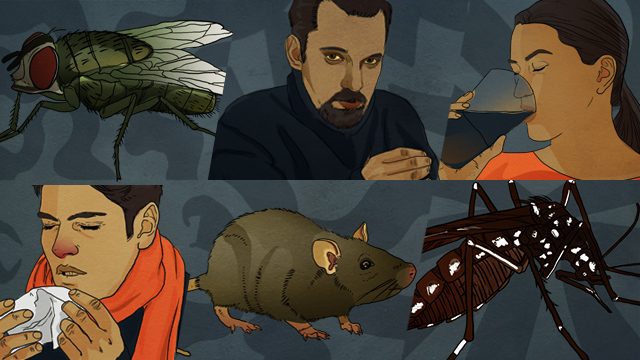
MANILA, PHILIPPINES – It’s the rainy season again.
With the Philippines’ location along the typhoon belt, at least 24 tropical cyclones enter the country. Making this worse is the habagat (Southwest monsoon), which is further enhanced by these typhoons, causing floods in different parts of the country.
According to state weather bureau PAGASA, there are about 11-16 more tropical cyclones that will enter the Philippines this year. With El Niño continuously affecting the country, more intense typhoons are expected.
The Department of Health (DOH) urges the public to be careful with diseases common during rainy season known as WILD – an acronym that stands for Water-borne diseases, Influenza, Leptospirosis, and Dengue. (READ: DOH warns public of common diseases during rainy season)
Here are some signs and prevention tips:
Waterborne diseases
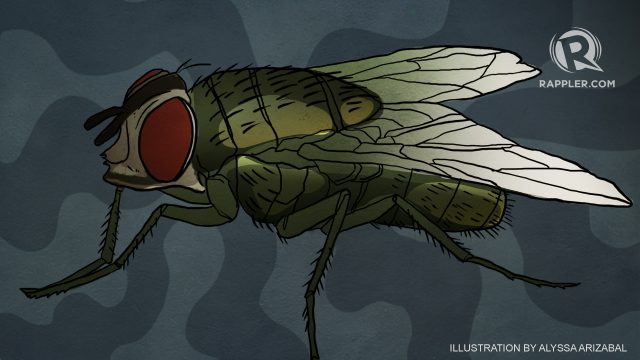
An acute intestinal infection caused by ingestion of food or water contaminated with the bacterium Vibrio cholerae. People who eat food or drink water contaminated by this bacteria have a high chance of getting infected.
Signs include:
- Sudden onset of frequent, painless watery stools
- Vomiting
- Rapid dehydration (sunken eyeballs, wrinkled and dry skin)
How to prevent?
- Drink safe and clean water only
- If unsure, boil drinking water (upon reaching boiling point, extend boiling for 3 or more minutes). You may also do water chlorination.
- Keep food away from insects and rats by covering it
- Wash and cook food properly
- Dispose of human waste properly
- Use the toilet properly and clean it every day. Wash hands with soap and water after using the toilet and before eating.
- Keep surroundings clean to prevent files, other insects and rodents from breeding
A World Health Organization (WHO) pre-qualified oral cholera vaccine is available for travelers and people in endemic areas. It is given in 2 doses and offers protection for years.

It is a virus that may be transferred from one person to another through the ingestion of food contaminated with human waste and urine of those who are already sick of Hepatitis A.
Signs include:
- fever
- flu-like symptoms: weakness, muscle and joint aches, loss of appetite, dizziness (with or without vomiting)
- abdominal discomfort
- after a few days, jaundice may follow
How to prevent?
- Wash hands after using the toilet, before preparing food, and before eating
- Dispose human waste properly
- Thoroughly cook oysters, clams, other shellfish for 4 minutes or steamed for 1 minute and 30 seconds.
- Practice safe handling and storage of food and water
The disease is self-limiting and may last for 1 to 2 weeks. Patient often recovers even without treatment.

An infectious disease, also known as enteric fever or just typhoid, that spreads through contaminated food and water or through close contact with someone who is infected.
Signs include:
- Sustained high fever
- Headache
- Malaise
- Anorexia (loss of apetite)
- Either diarrhea or constipation
- Abdominal discomfort
How to prevent?
- Avoid drinking untreated water
- Boil water for drinking (upon reaching boiling point, extend boiling for 2 or more minutes) or do water chlorination
- Cook food well and always cover food to prevent contamination from flies and other insects
- Avoid eating unsanitary street-vended foods. Wash hands with soap and water after using the toilet and before eating.
- Keep surroundings clean to prevent breeding of flies
- Get immunized with WHO pre-qualified oral injectible vaccines
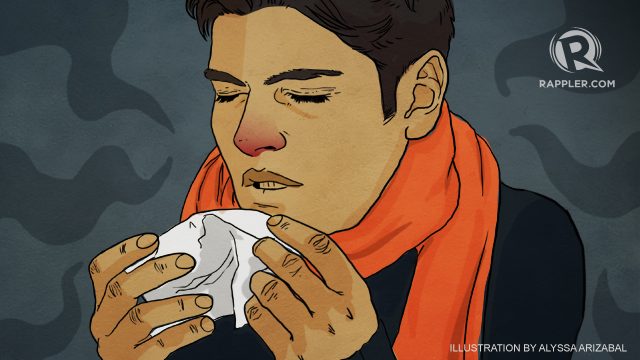
A viral infection that attacks the respiratory system. It is transmitted through contact with a person who coughs or sneezes, or with surfaces, material and clothing contaminated with the discharges of an infected person.
Young children, the elderly, pregnant women, and people who have weakened immune system are at risk to this disease.
Signs include:
- Fever of at least 38C
- Headache
- Runny nose
- Sore throat
- Cough
- Muscle or joint pains
How to prevent?
- Avoid crowded places
- Cover mouth and nose when sneezing or coughing
- Wash hands frequently
- Annual flu vaccine
- Minimize contact and distance yourself by at least 1 meter from infected people
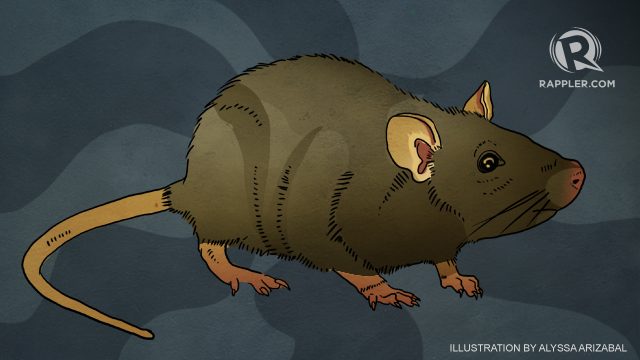
A bacterial infection transmitted when urine and feces of infected animals such as rodents, contaminate the soil, water, and vegetation.
A person may get leptospirosis by ingesting contaminated food or water, when broken skin and open wounds, or when eyes, nose, sinuses and mouth come in contact with contaminated water (usually flood water) or soil. Incubation period of bacteria is 7-10 days.
Signs include:
- Fever
- Muscle pain
- Headache
- Calf-muscle pain and reddish eyes
For severe cases (liver/brain involvement or kidney failure)
- Yellowish body discoloration
- Dark-colored urine
- Light stools
- Low urine output
- Severe headache
How to prevent?
- Avoid swimming or wading in flood water
- Use boots and gloves
- Drain potentially contaminated water
- Control rodents in the household by using rat traps or rat poison
- Maintain cleanliness in the house
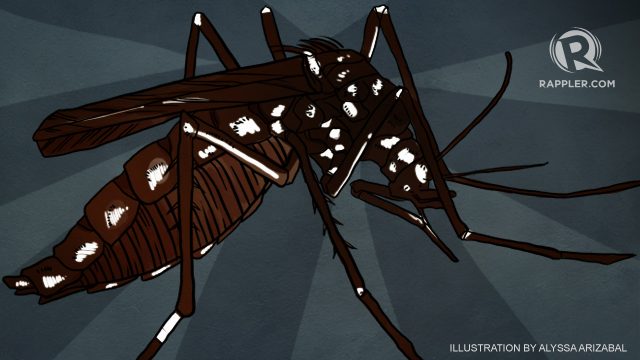
A disease common in tropical and sub-tropical countries in the world like the Philippines, Dengue is transmitted through the bite of an Aedes mosquito, according to WHO. Dengue fever is potentially fatal and mainly affects children. (READ: Crowdsourcing dengue alert)
Here are 6 ways to prevent dengue, according to DOH:
- Cover water drums and water pails at all times to prevent mosquitoes from breeding
- Replace water in flower vases once a week
- Clean all water containers once a week. Scrub the sides well to remove eggs of mosquitoes sticking to the sides
- Clean gutters of leaves and debris so that rainwater will not collect as breeding places of mosquitoes
- Puncture or cut old tires used as roof support to avoid accumulation of water
- Collect and dispose all unusable tin cans, jars, bottles, and other items that can collect and hold water.
Read these tips on how to stay healthy during the rainy season. – Rappler.com
Source: Department of Health
Add a comment
How does this make you feel?
There are no comments yet. Add your comment to start the conversation.